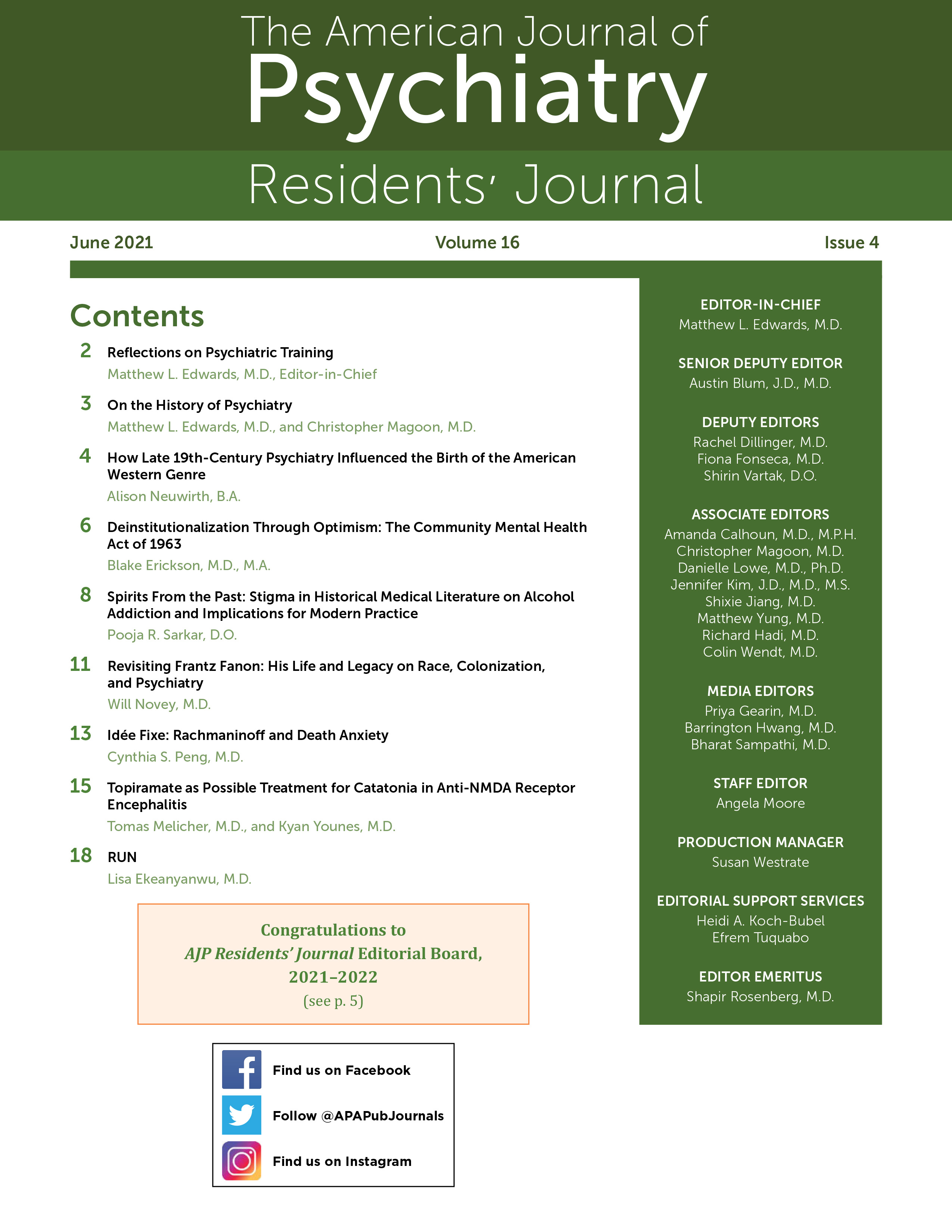In a recent article published in the
Journal of the History of Medicine and Allied Sciences, medical historians David Jones, Jeremy Greene, Jacalyn Duffin, and John Harley Warner (
1) make a compelling argument for teaching the history of medicine in undergraduate medical education and postgraduate medical training. Rather than employing history as a secondary field to introduce topics in medical professionalism and humanities, they propose that history should be treated "as an essential component of medical knowledge, reasoning, and practice." Using examples as wide ranging as disease etiology, medical decision making, and the cultural history of medicine, Jones and colleagues underscore the valuable role that history can play in the development of physicians.
As young medical historians and physicians-in-training, we have also felt pressure to teach medical history in a way that is applicable to clinical practice. This framing of the history of medicine, however, can relegate the humanistic disciplines to a sort of second-class status. History can indeed enrich our medical knowledge. It can shape how we think about medical and scientific phenomena. And it can inform how we treat our patients. But medical history also provides us with an opportunity to learn about the past, irrespective of its clinical utility. Moreover, reading the history of medicine can provide answers to the most pressing questions we face as healers.
This special issue of the American Journal of Psychiatry Residents' Journal explores these critical issues at the interface of psychiatry and history. The history of psychiatry is richly textured and varied, as evidenced by the contributions to this issue, spanning centuries, continents, and populations. Cynthia Peng's article analyzes how a layperson's life and work can yield valuable insights for the psychiatric trainee. It explores how the famous composer Sergei Rachmaninoff wove themes of death into his work, perhaps as an outlet for his own search for understanding of the subject.
Two additional pieces focus on the life and contributions of psychiatrists from prior eras. Will Novey chronicles the fascinating life of Dr. Frantz Fanon—a Caribbean-born, French-trained psychiatrist who practiced in Algeria and ultimately joined that country's battle for independence. This article frames Dr. Fanon as an example of a psychiatrist who struggled against racism and hierarchy throughout his career, with obvious relevance to today. Pooja Sarkar analyzes how notable 18th- and 19th-century physicians—Benjamin Rush, Thomas Sewall, and Samuel Pearsons—understood alcohol addiction and explores the ways in which their views were at once moralistic and medicalized.
Psychiatrists-in-training today experience the ripple effects of the deinstitutionalization policies of the 1960s and 1970s. These policies are often maligned for their shortsightedness, and Blake Erickson provides welcome context to that time, demonstrating how deinstitutionalization was a product of an optimistic public spirit that ultimately fell short of its promise. Lastly, this issue also considers the impact of psychiatry on American culture. Alison Neuwirth explains how the American Western literary, film, and television genre traces its roots to a common psychiatric treatment of the time known as the "camp cure."
As coeditors of this special issue on the history of psychiatry, we hope that it will provide insight into narratives of mental illness throughout history. Certainly, some of its themes, topics, and lessons may provide useful clinical pearls for psychiatrists at any stage in their training or practice. Yet each article provides important perspectives on our understanding of the history of psychiatry and how our societies perceive and approach people with illness.
Acknowledgments
Dr. Edwards thanks Daniel P. Mason, M.D., Assistant Professor of Psychiatry at Stanford University School of Medicine for sharing his perspectives on the history of medicine.
